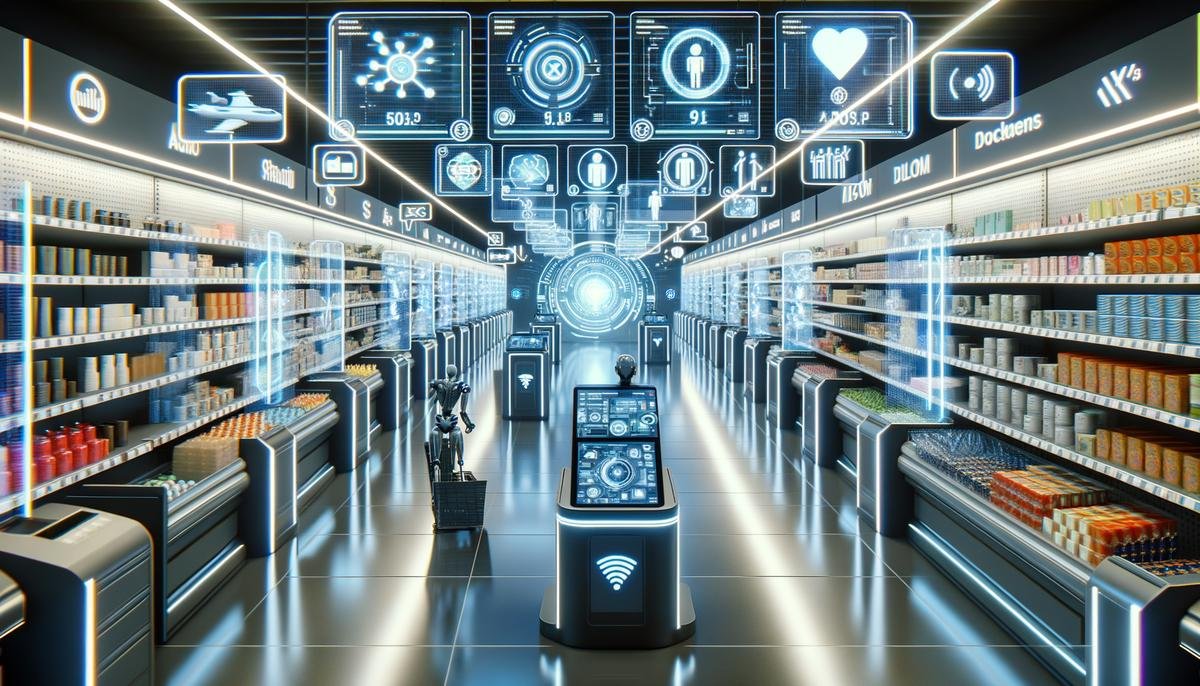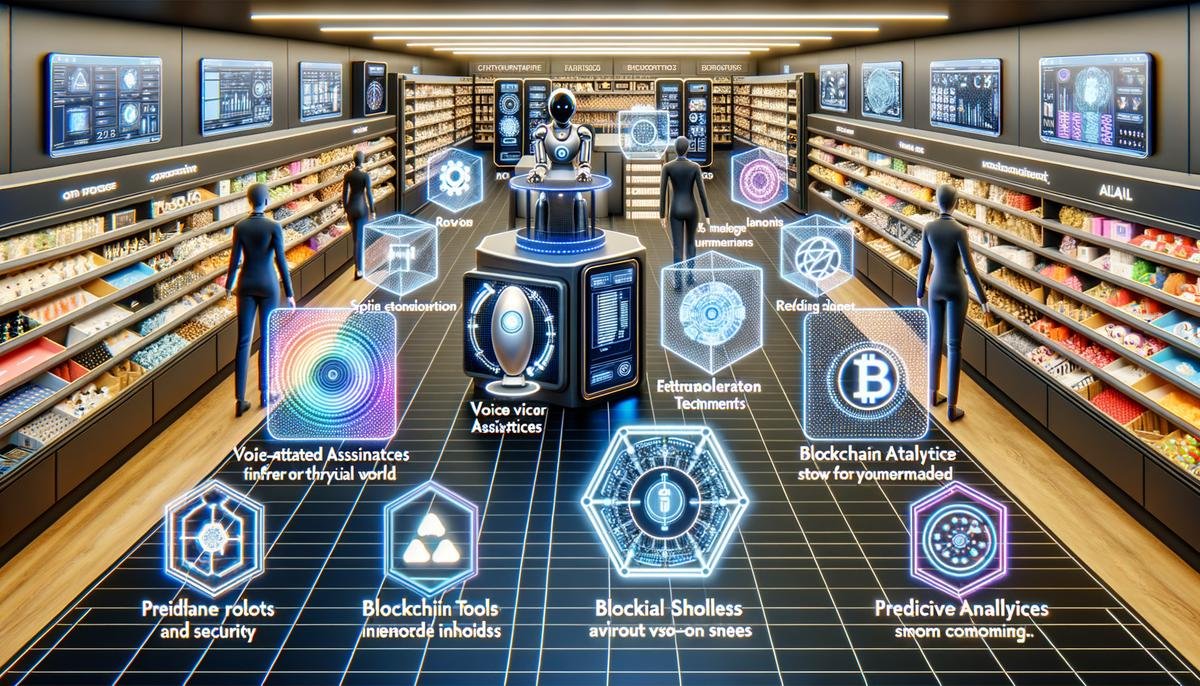Artificial intelligence is transforming the landscape of retail, offering a glimpse into a future where every shopping experience is streamlined, personalized, and more secure. This technological advancement is not just about making transactions quicker; it’s about creating a shopping environment that understands and adapts to the needs of every customer. As we navigate through the various facets of AI in retail, we uncover how this technology is not just changing the way we shop but also how retailers manage their operations, offering insights into a world where efficiency and customer satisfaction go hand in hand.
Understanding AI in Retail
Artificial intelligence is reshaping retail, making shopping faster and much more personalized. AI powers chatbots on e-commerce sites, where they answer queries in real time, mirroring the in-store experience but from the comfort of home. These bots get smarter with each interaction, thanks to the magic of machine learning, ensuring that customers find exactly what they need without scrolling for hours.
On product recommendations, AI is the unseen matchmaker on retail websites. It analyzes past purchases, browsing history, and even what items you lingered on to suggest products you’re likely to buy. This isn’t just guesswork; it’s grounded in data patterns, turning casual browsers into buyers by showing them what they didn’t know they needed.
Behind the scenes, AI streamlines inventory management to a level humans alone could never achieve. Automated inventory systems predict stock needs with precision, considering factors like seasonality, trends, and even social media buzz. This means your favorite items are less likely to run out, and stores can avoid the cost of overstocking.
AI doesn’t stop at sales; it extends to security. Systems equipped with AI monitor for unusual purchase patterns or behavior, flagging potential fraud before it hits. This proactive approach keeps customer trust high and fraudsters at bay.
AI’s role in retail signifies a shift towards a digital-first strategy. Traditional retailers are knitting AI into their operations to stay relevant in an increasingly digital marketplace. From small online shops employing chatbots for better customer service to large department stores leveraging AI for inventory and fraud prevention, the adoption span is wide.
In faster checkouts, AI steps in to quicken the process. Some stores now use AI-enabled cameras to identify items in a cart, letting shoppers skip the checkout line altogether. This technology not only saves time but also offers a glimpse into a future where shopping could be entirely frictionless.
In essence, AI in retail is like having a personal assistant that’s on a mission to make shopping smoother, faster, and more secure. It’s the quietly efficient engine driving the modern retail experience forward, crafting a world where every shopper feels understood and every store operates with heightened efficiency.

Personalization Through AI
AI learns customer preferences by analyzing past purchases. This process identifies patterns, allowing AI to anticipate future buying decisions. It tunes into the unique tastes and interests of shoppers, ensuring a more engaging and tailored shopping experience.
By sifting through vast amounts of transactional data, AI discerns subtle buying habits. It picks up on frequencies, like how often a customer buys a certain type of product, leading to smarter predictions about what they might want next.
AI goes beyond basic recommendations by adjusting pricing dynamically. It considers a shopper’s price sensitivity, gathered from their purchase history, and offers personalized discounts to entice purchases.
This technology also customizes marketing messages on an individual level. By understanding a customer’s journey, AI crafts messages that resonate personally, increasing the chance of conversion.
It enhances the browsing experience through visual and voice search capabilities. Customers find products by uploading images or speaking, streamlining the search process to match their preferences more accurately.
AI taps into social media and browsing data to understand personal styles and interests. This insight allows for the creation of highly targeted ad campaigns that speak directly to a user’s current needs or desires.
The predictive power of AI forecasts emerging trends, letting retailers stock up on products likely to resonate with their audience. It spots what’s gaining popularity, keeping offerings fresh and aligned with customer desires.
Personalization extends to post-purchase interactions, too. AI follows up with tailored content, suggestions for related products based on what a customer just bought, or helpful tips on using a recent purchase.
AI also interfaces with wearable technology to provide real-time, context-aware suggestions. For example, suggesting a nearby coffee shop with preferences already known, blending online shopping advantages with physical world interactions seamlessly.
AI-driven virtual fitting rooms leverage customer measurements and past preferences to recommend the perfect size and style, reducing returns and increasing satisfaction by helping customers choose right the first time.
In sum, AI personalizes the shopping journey by marrying advanced data analytics with a deep understanding of individual preferences. It transforms how retailers interact with customers, making every step of the shopping process smoother, more intuitive, and uniquely tailored to each shopper.

Challenges and Ethical Considerations
Harnessing AI for predictive maintenance in retail isn’t just about preventing equipment failures; it’s a complex endeavor involving myriad data privacy concerns. Retailers must ensure the data feeding predictive models is collected and used in compliance with regulations such as GDPR and CCPA, emphasizing the challenge of balancing operational efficiency with legal constraints.
Data security is another significant concern, with cyber threats evolving as quickly as the technology itself. Protecting customer and operational data against breaches is paramount, not only for consumer confidence but to avoid substantial financial and reputational damage.
Biased algorithms present a subtle yet profound ethical dilemma. If AI in retail is trained on historical sales data without proper oversight, it could unintentionally perpetuate existing disparities, pushing certain demographics into marginalisation by assuming past purchasing patterns are an accurate reflection of future needs or desires.
On the personalization front, the thin line between engaging customers and breaching their privacy is a tightrope retailers walk daily. Ensuring AI-driven personalization respects individual boundaries without crossing into intrusive territory is a nuanced exercise in ethical judgment. Retailers must navigate this by deploying transparent policies and giving consumers control over their data.
Adopting AI also raises questions about workforce displacement. As AI takes over repetitive tasks, retail employees face uncertainty about their job security and future roles within the industry. This challenge extends beyond mere technology implementation to fostering an environment where human workers can coexist with AI, perhaps focusing on more creative or complex customer service roles.
Compliance is a constantly moving target, as governments around the world scramble to update regulations that keep pace with AI’s evolution. Retailers not only have to adapt to current laws but must also stay ahead of future legal changes that could affect how they deploy AI technologies.
Consumer trust is the cornerstone of any successful retail operation, and AI applications can risk eroding this trust if not considered carefully. Retailers must commit to ethical AI use, prioritizing transparency and consumer welfare to ensure that technological advances enhance the shopping experience without sacrificing privacy or security.
Finally, scalability of AI solutions poses its own set of challenges. As retailers aim to implement AI across different outlets and online platforms, ensuring these technologies are adaptable and scalable enough to meet varying demands and capacities becomes crucial. Balancing innovation with scalability requires foresight and strategic planning to avoid potential pitfalls.
As retailers tread into the burgeoning terrain of AI, understanding these challenges and ethical considerations is crucial. Striking a balance between leveraging technology for operational benefits while ensuring ethical standards and consumer trust are maintained will define the future of AI in the retail sector.

Future Trends in AI and Retail
Augmented reality (AR) shopping experiences are bringing a new wave of interaction to the retail sector. Customers can now try furniture in their homes virtually before making a purchase. This AR interface bridges the gap between the digital and physical worlds, making online shopping as tangible as it gets without leaving the house.
Voice-activated shopping assistants are changing how we compile our grocery lists. Simply speaking to a device can now add milk, bread, and other essentials to an online shopping cart. It’s convenience at its finest, streamlining mundane tasks with just a few spoken words. Imagine preparing dinner and realizing you’re out of an ingredient; a voice-activated assistant saves the day without disrupting your meal prep flow.
Blockchain technology offers a transparent and secure method to track products from factory to shelf. This not only combats counterfeit goods but also assures consumers of the authenticity and ethical sourcing of their purchases. Imagine scanning a QR code on your jacket and tracing its journey from a cotton field to the retail display. This transparency builds trust and satisfaction among eco-conscious shoppers.
Predictive analytics powered by AI can forecast market demands with incredible accuracy, ensuring retailers are always a step ahead. By analyzing vast datasets on consumer behavior, seasonal trends, and global events, AI can predict what products will be the next big hit. This means retailers can optimize stock levels, reducing both excess inventory and missed sales opportunities.
Social robots in stores could revolutionize customer service by providing personalized assistance. These robots can navigate aisles, answer questions, and even guide customers to products. Picture walking into a store and being greeted by a robot that already knows your shopping preferences and can make recommendations based on your previous purchases.
Smart shelves equipped with weight sensors and RFIDs ensure items are never out of stock. These shelves alert store managers in real time when it’s time to restock, making empty shelves a thing of the past. Furthermore, they can collect data on which products are picked up but not purchased, offering insights into consumer hesitations or preferences.
Augmented reality mirrors in fashion retail allow customers to try on outfits virtually, speeding up decision-making processes. These mirrors can suggest sizes, colors, or similar items, offering a futuristic fitting room experience. Imagine standing in front of a mirror, swiping through options without changing clothes, and getting fashion advice tailored to your body type and preferred style.
AI-generated personalized discounts not only attract customers but also create a sense of loyalty and individual attention. Based on a customer’s shopping habits, AI can offer bespoke discounts on their favorite products or items they have shown interest in. This precision marketing enhances customer satisfaction while boosting sales.
In wrapping up, the integration of these AI technologies in retail not only enhances customer experiences but also optimizes operations, offering a peek into the future of retail that is both efficient and customer-centric.

In conclusion, the essence of AI in retail lies in its ability to make shopping a smoother, faster, and more personalized experience. By analyzing data and learning from each interaction, AI crafts a shopping journey that feels both intuitive and tailored to individual preferences. This isn’t just about the future of shopping; it’s about the present reality where AI is already shaping how retailers operate and how customers engage with their favorite brands. The integration of AI in retail is a testament to the power of technology in enhancing our daily lives, making every shopping experience not just a transaction, but a journey tailored to each shopper’s needs.



